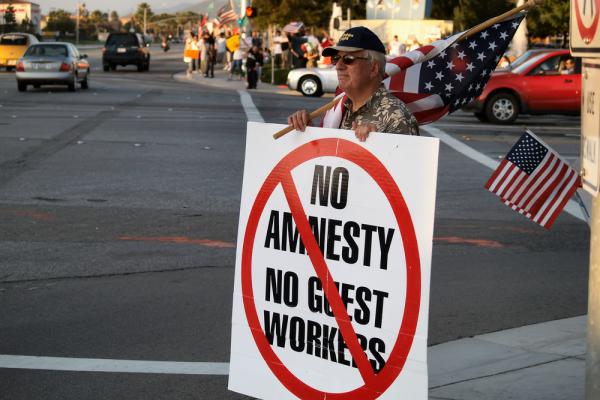Some of this year’s crop of politicians tell us that illegal or undocumented immigrants pose a deadly threat to our country. I say that anti-immigrant rhetoric is the more dangerous threat. It has been deadly before, here and in other countries. It can easily become deadly again.
You can watch the rhetorical escalation up the ladder — or down the slippery slope, choose your metaphor — toward danger.
Step one: It is perfectly reasonable for those concerned about illegal immigration to express concern about our nation’s ability to secure its borders, especially from those who might pose a real threat. As one who regularly waits in lines to pass through border controls, I get it. In a nation-state world, borders matter. All nations attempt to secure their borders. The United States has a right and a need to secure its borders.
Step two: It is also perfectly reasonable to be concerned about potential economic impacts of illegal immigration. It is reasonable to fear the creation of a job market for undocumented immigrants that can undercut employment for American citizens. It is reasonable to fear a drain on government social services or health care spending. Of course, if research demonstrated that undocumented immigrants do not create more unemployment or cost more than they contribute to tax dollars, this would resolve the concern.
Step three: It is debatable whether it is reasonable to be concerned that undocumented immigrants pose a threat to American culture or the predominant use of the English language. The reasonableness of such concerns relates entirely to our vision of America. What kind of country are we or should we be? A “white” country, or a multiracial country? A predominantly or exclusively English-speaking country, or a polyglot nation? A European-colonial-descendant nation, or a multiethnic nation with people coming from all parts of the world? To opponents of (illegal, and sometimes legal) immigration, I say that if this is your concern, say it loud and plain, and let us debate the matter.
Step four: It is not debatable but abhorrent to express concern that undocumented immigrants as a group are dangerous and morally inferior. This, of course, was assumed in Donald Trump’s infamous comment earlier this year: “When Mexico sends its people, they’re not sending their best. … They’re sending people that have lots of problems. … They’re bringing drugs. They’re bringing crime. They’re rapists. And some, I assume, are good people.”
Notwithstanding the slight caveat at the end, this comment dismisses Mexican (and surely not just Mexican) immigrants, as a group, in a very dangerous way. It invites all “non-Mexicans” to look at all “Mexicans” in a demeaning way and to treat them accordingly. Citizenship status gradually melts away here as the central issue. It is skin color and assumed ethnicity and nationality that is the problem. And some evidence is coming in that brown-skinned, Hispanic, or “Mexican-looking” people face routine and even escalating dehumanization and degrading treatment today. A spirit is abroad in the land that goes far beyond one candidate.
It is a proven pattern: When one group of people in a country is taught to look at another group of people in that country as inferior, immoral, and dangerous, the latter group will eventually pay a huge price. All kinds of indignities, discrimination, and violence can be expected. Need I cite examples?
So we have reason to be concerned about illegal immigration. But right now we ought to be more concerned about campaign rhetoric inflaming racial, ethnic, and nationalist fears in some very dangerous ways. All of us need to be on our guard against it.
Got something to say about what you're reading? We value your feedback!

